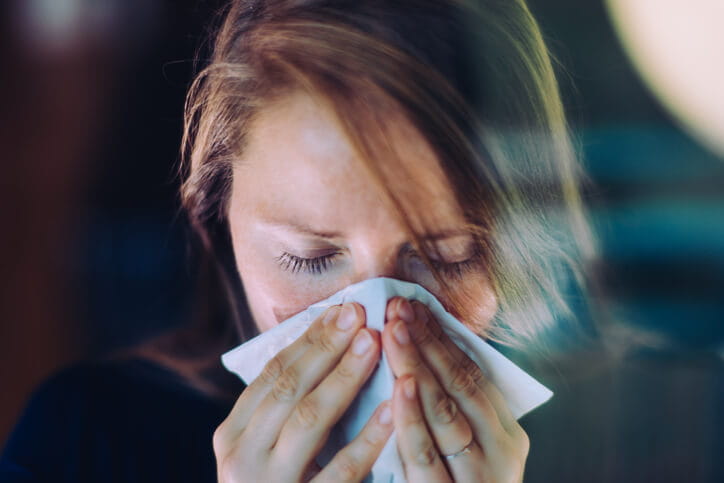The Relationship Between Asthma & The Flu

Having asthma does not put you at greater risk of contracting the respiratory illness called influenza (often referred to as “the flu”). However, the combination of asthma and respiratory inflammation caused by the flu can produce severe symptoms, including the triggering of asthma attacks. It also increases the risk of serious complications like pneumonia. Consequently, it is especially important that people with asthma know how to prevent the flu, and treat it if it occurs.
The Flu & Asthma
Between 5-20% of Americans get influenza each flu season and, according to the Centers for Disease Control and Prevention (CDC), more than 200,000 people are hospitalized for flu-related problems each year. Fortunately, there are steps you can take to minimize your risk of getting sick. Here’s what you should do:
- Get a flu shot every year. The shot is effective and safe. It cannot cause the flu or trigger an asthma attack and is now approved for those with egg allergies. Be sure to get the shot, as the nasal spray is not recommended for people with underlying conditions, including asthma.
- Get a pneumococcal pneumonia vaccine. Pneumococcal pneumonia can be especially serious in people who have asthma.
- Practice good hygiene. Wash your hands frequently with warm, soapy water. Avoid touching your eyes or mouth, especially while out in public or before you have had a chance to wash your hands.
- Avoid people who are sick. The flu is easily transmitted through droplets in the air or on surfaces from a cough or sneeze.
- Avoid sharing food and beverages with others. This is a good idea even if someone doesn’t appear ill, as an infected person is contagious for a day before symptoms appear and up to seven days after contracting the illness.
How to Know if You Have the Flu
Despite your best prevention efforts, it is still possible to come down with the flu. You should suspect that you may have the illness if you experience these symptoms:
- Fever
- Sore throat
- Cough
- Stuffy or runny nose
- Headache
- Body aches
- Chills
- Fatigue
Some people who catch the flu also have vomiting and diarrhea. While it is common to have a fever with the flu, you can have the respiratory symptoms with no elevation of your temperature.
What to Do If You Catch the Flu
If you suspect you have the flu, contact your doctor right away. A prescription antiviral medication can help suppress viral activity and the resulting respiratory inflammation, which can worsen asthma symptoms. Ideally, you should begin treatment with an antiviral within 24-48 hours of the appearance of flu symptoms.
You should also stay home, rest and drink plenty of fluids. Over-the-counter medication can be used as directed to address symptoms.
Learn more about the relationship between these two respiratory conditions by talking with your doctor and how to get vaccinated against the flu by our convenient Urgent Care locations.



